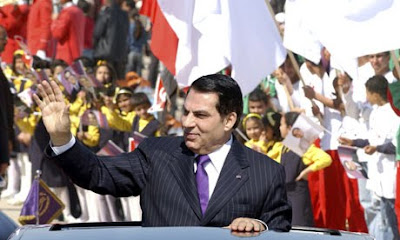
An appetite for state secrets led to bans on western newspapers and hacked news websites across the Middle East
Ian Black
guardian.co.uk, Friday 17 December 2010
"WikiLeaks may be breaking new ground to promote freedom of information by releasing leaked US diplomatic cables, but Arab governments have been resorting to old tricks to ensure that nothing too damaging reaches their subjects.
Ian Black
guardian.co.uk, Friday 17 December 2010
"WikiLeaks may be breaking new ground to promote freedom of information by releasing leaked US diplomatic cables, but Arab governments have been resorting to old tricks to ensure that nothing too damaging reaches their subjects.
Tunisia, Saudi Arabia and Morocco have all tried to stem the flow of Wiki-revelations, whether the subject is corruption, authoritarianism or simply the embarrassment of having private exchanges with American interlocutors enter the public domain. There is certainly an appetite for reading state secrets.Stories about the business interests of the king of Morocco and the nepotism of the unpopular president of Tunisia – both countries normally attract little interest in Britain - generated heavy traffic on the Guardian website.
But Le Monde, whose Francophone audience cares far more about the Maghreb, found its print edition banned from Morocco. Spain's El Pais, another of the five media partners in the WikiLeaks enterprise, was banned too. So was Al-Quds Al-Arabi, the independent London-based pan-Arab daily which has been following up on the stories from the start.....
Lebanon's Al-Akhbar , a leftist and pro-Hizbullah paper, pulled off quite a trick: it somehow obtained unauthorised leaks from the WikiLeaks cache, posting 250 US cables from eight Arab countries on its website – only to find that it was cyber-attacked (and replaced by a shimmering pink Saudi girl chat room) when it published one of two devastatingly frank documents about President Ben Ali of Tunisia,.....
In Arab countries where the media is state-controlled and even privately owned outlets exercise self-censorship to stay within well-defined red lines, outright censorship is usually a last resort.
So in Egypt, for example, there was little coverage of WikiLeaked material about the presidential succession, the role of the army and Hosni Mubarak's hostility to Hamas – all highly sensitive issues, though the independent Al-Masry Al-Youm did run some cables that were passed on by Al-Akhbar in Beirut......
.....but Yemen's government faced awkward questions in parliament about its private admission of lying about US air strikes against al-Qaida – as well as concern that President Ali Abdullah Saleh's fondness for whisky would give ammunition to his Islamist critics......
Some wondered why there are so few damaging revelations about Israel – giving rise to at least one conspiracy theory about collusion between Julian Assange and Binyamin Netanyahu.......
Standing back to survey the big picture as the WikiLeaks effect fades in the Middle East, there are two other striking conclusions: one is the enormous scale of the US effort to contain Iran and its friends. The other – related – one is the sheer intimacy of US links to Israel.
The US embassy in Tel Aviv is an inadequate prism through which to view a genuinely special relationship. No wonder that Netanyahu, unlike many Arab leaders, hasn't been too bothered by what WikiLeaks told us."

No comments:
Post a Comment